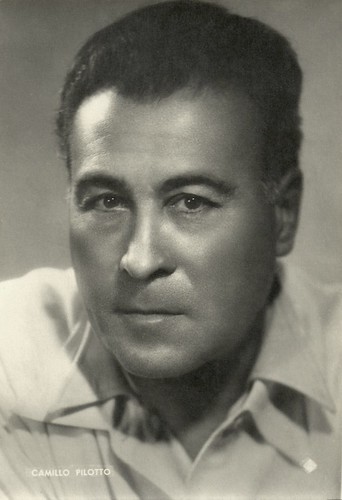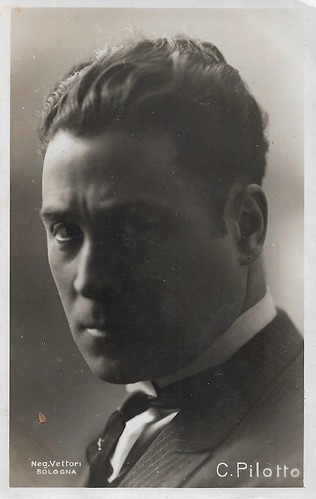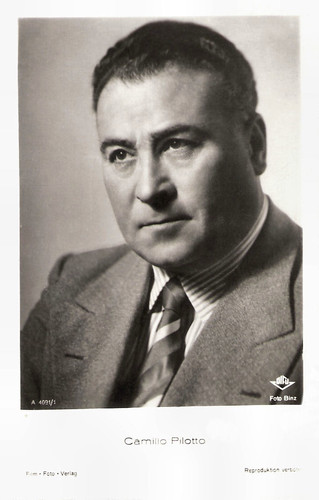Italian stage and screen actor Camillo Pilotto (1888-1963) started his film career in the early silent cinema, but he only became a star after the sound film was introduced. During the fascist regime of Benito Mussolini, he was popular through the Telefoni Bianchi films, the sophisticated Italian comedies of the 1930s, but he also starred in such historical epics as Scipione l’Africano/Scipio Africanus: The Defeat of Hannibal (1937) and Abuna Messias/Cardinal Messias (1939).

Italian postcard by ASER, no. 92. Photo: Ciolfi.
Camillo Pilotto was born in Roma (Rome) in 1888 (according to Wikipedia; IMDb mentions 1890). He was the son of actor and stage writer Libero Pilotto.
In 1903, at the age of 15, he started to perform on stage with the company of Ermete Novelli and continued to perform with the most renowned theatre companies until the late 1950s.
Remarkable in the postwar era was his part of Cotrone in Luigi Pirandello’s 'I giganti della montagna' (The giants of the mountain), directed by Giorgio Strehler. Pilotto was personally attached to Pirandello.

Italian postcard by ASER, no. 92. Photo: Ciolfi.
Personally Attached to Pirandello
Camillo Pilotto was born in Roma (Rome) in 1888 (according to Wikipedia; IMDb mentions 1890). He was the son of actor and stage writer Libero Pilotto.
In 1903, at the age of 15, he started to perform on stage with the company of Ermete Novelli and continued to perform with the most renowned theatre companies until the late 1950s.
Remarkable in the postwar era was his part of Cotrone in Luigi Pirandello’s 'I giganti della montagna' (The giants of the mountain), directed by Giorgio Strehler. Pilotto was personally attached to Pirandello.
Pilotto’s film debut happened in 1916 in Il sopravissuto/His Daughter's Second Husband (Augusto Genina, 1916) after which a handful of silent films followed, including La capanna dello zio Tom/Uncle Tom's Cabin (Riccardo Tolentino, 1918), based on the novel by Harriet Beecher Stowe.
During the 1920s, Camillo Pilotto was hardly seen in the cinema, but his career as a film actor really set off in the 1930s.

Italian postcard. Photo: Vettori, Bologna.
White Telephones
When sound film set in, Camillo Pilotto immediately had a part in the first sound film La canzone dell’amore/The Song of Love (Gennaro Righelli, 1930). The film was very loosely based on a Luigi Pirandello short story called 'In silenzio' (In Silence) about a woman, Lucia (Dria Paola), who cares for her widowed mother's out-of-wedlock child.
Pilotto played the ex-lover of the mother who suddenly claims the child, but eventually lets Lucia have the child when he notices how desperately she wants the baby. Gerald A. DeLuca notes at IMDb: "La canzone dell'amore (The Song of Love) was extraordinarily popular at the time of its release in Italy, and critics praised its beauty and skill at the hands of director Gennaro Righelli as well as the performances, especially that of Dria Paola."
Next, Pilotto starred opposite Carmen Boni in the Italian-language Paramount productions La vacanza del diavolo/The Devil's Holiday (Jack Salvatori, 1931), and La riva dei bruti/Dangerous Paradise (Mario Camerini, 1931).
In the early 1930s, Pilotto became one of the major actors in the ‘Telefoni Bianchi’ films, the Italian romantic comedy genre made by such directors as Nunzio Malasomma (La telefonista/The Telephone Operator (1932)), Amleto Palermi (La segretaria per tutti/The Secretary for Everything (1933)), and Alessandro Blasetti (Il caso Haller/The Haller Case (1933) starring Isa Miranda).
However, he also played the memorable parts of the depraved Duke Alessandro in Lorenzino de’Medici/The Magnificent Rogue (Guido Brignone, 1936), starring Alexander Moissi, and Hannibal, the one-eyed, lustful, and streetwise opponent of the Roman leader Scipio (Annibale Ninchi) in the epic production Scipione l’Africano/Scipio Africanus: The Defeat of Hannibal (Carmine Gallone, 1937).
This was also the start of a series of parts in heroic historical and contemporary films like Pietro Micca (Aldo Vergano, 1938) and Abuna Messias/Cardinal Messias (Goffredo Alessandrini, 1939). The latter film was a controversial historical legitimation for the war in Abyssinia.

Italian postcard by Ed. Manenti Film, Roma. Publicity still for the Italian historical film Lorenzino de' Medici (Guido Brignone, 1935). The Henry VIII-like figure is the perfidious Duke Alessandro, played by Camillo Pilotto, who covets Lorenzo's (Alexander Moissi) sweetheart (Germana Paolieri).
The Italian Voice of Wallace Beery
Camillo Pilotto also had important parts in two postwar period pieces: Il passatore/Bullet for Stefano (Duilio Coletti, 1947) with Rossano Brazzi, and Penne nere/Black Feathers (Oreste Biancoli, 1952) starring Marcello Mastroianni.
Pilotto was also active in dubbing foreign films. He was the Italian voice of Wallace Beery, Eugene Pallette, Victor McLaglen, and Henry Stephenson.
All in all, Pilotto played in over 50 sound films (until 1952), but he also acted in various television series. Among these were some highly successful ones like Piccolo mondo antico/Small ancient world (Silverio Blasi, 1957), Canne al vento/Reeds to the wind (Mario Landi, 1958), and Il mulino del Po/The Mill of the Po (Sandro Bolchi, 1963) starring Raf Vallone.
Camillo Pilotto’s last performance was in Le anime morte/The dead souls (Edmo Fenoglio, 1963) based on the novel by Nikolai Gogol. The film was released after his death in Rome, in 1963.

German postcard by Film-Foto-Verlag, no. A 4091/1, 1941-1944. Photo: Binz / Difu.
Sources: Gerald A. DeLuca (IMDb - now defunct), Wikipedia (Italian), and IMDb.
This post was last updated on 14 April 2021.
No comments:
Post a Comment